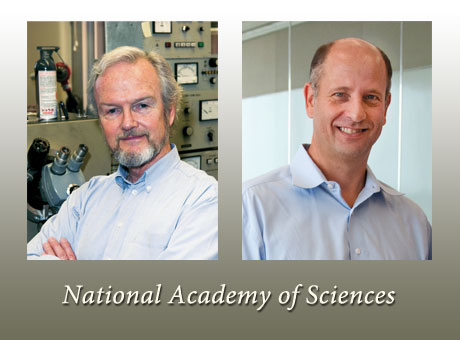
John E. Heuser, MD, left, and Scott J. Hultgren, PhD, have been honored for their distinguished and continuing achievements.

John E. Heuser, MD, left, and Scott J. Hultgren, PhD, have been honored for their distinguished and continuing achievements.
Two Washington University scientists have been elected to the National Academy of Sciences in recognition of their distinguished and continuing achievements in original research.
John E. Heuser, MD, professor of cell biology and physiology, and Scott J. Hultgren, PhD, the Helen L. Stoever Professor of Molecular Microbiology and director of the Center for Women’s Infectious Disease Research, are among the 72 new members and 18 foreign associates elected to the academy this year.
Heuser was recognized for his discovery of the recycling of synaptic vesicles in nerve terminals. This led to a general realization in cell biology that membrane recycling occurs in all cells, not just in nerves, and is an important component of all cells’ ability to take up materials from their environment and to secrete material outward.
In addition to overseeing the electron microscopy facility he created at Washington University, Heuser recently has become the director of a new microscopy center at Kyoto University in Japan in its Institute for Cell and Material Sciences, a new government-mandated institute designed to foster international scientific collaboration in nano- molecular therapeutics and regenerative medicine.
Hultgren was recognized for his work in microbial/host interactions, the basis of all infectious disease. His research has shed light on the basic mechanisms that determine how bacteria interact with the many different surfaces in the body and how they get out of control and exert adverse effects in a variety of debilitating infectious diseases. His research is reshaping technologies involved in the design of vaccines and other procedures that are used to diagnose, treat and prevent urinary tract infections.
The Center for Women’s Infectious Disease Research, which Hultgren directs, focuses on issues including the causes of urinary tract infections, infections that lead to premature delivery and vaginitis, and, in general, the important roles that microorganisms play in all the life-threatening conditions, such as cancer and heart disease.